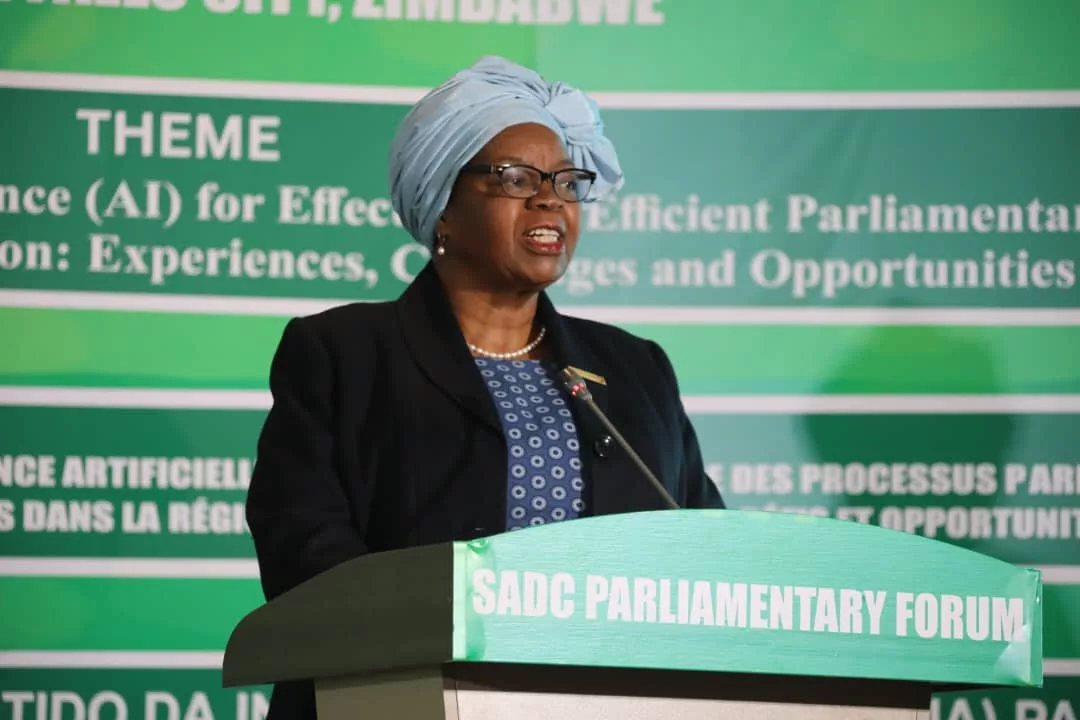|
Getting your Trinity Audio player ready...
|
VICTORIA FALLS, ZIMBABWE – With unwavering commitment and collective action, a malaria-free Southern African Development Community (SADC) is possible, Prof Sheila Tlou, the Special Ambassador of the African Leaders Malaria Alliance (ALMA), has said.
She was addressing the 57th SADC Parliamentary Assembly today 6 June 2025 in Victoria Falls, Zimbabwe.
Prof Tlou said she was emboldened by the fact that in the last two years, the World Health Organization (WHO) certified two countries (Cabo Verde and Egypt) as malaria-free. These two countries joined other countries on the continent, including three SADC countries, Lesotho, Mauritius, and Seychelles which have been certified malaria-free.
“This stands as a testament to what can be achieved in Africa with unwavering commitment and collective action. We take great lessons from what was achieved by these countries, and it proves that a malaria-free SADC is possible, a Malaria-free Africa is possible, and a Malaria-free world is possible,” she said.
Africa is at the centre of a perfect storm that threatens to disrupt essential life-saving malaria services. These include critical financial shortfalls for malaria programmes, linked to the ongoing financial crises, the impact of climate change, insecticide and drug resistance, and humanitarian crises, all of which need to be addressed urgently to prevent malaria upsurges.
Prof Tlou said because of that, Africa is off track to meet the ambitious target to end malaria and still bears the heaviest burden of the disease. According to the WHO, there were 251 million malaria cases and 579,414 malaria deaths in African Union Member States in 2023, and progress has stalled since 2015 in several countries.
“These statistics translate into lives lost, families devastated, and communities burdened, particularly impacting women and children. Malaria not only jeopardizes individual health but also undermines socio-economic development. Despite the gaps in the implementation of malaria control interventions, significant progress has been made in the region. The leadership and determination of our countries, as well as the commitment from our development partners, will enable us to accelerate progress towards elimination.
“Through coordinated action, collaborative partnerships, research, innovation, and sustained accountability mechanisms, we can realize our vision of malaria elimination. After all, malaria is a pathfinder for health system strengthening, primary health care, pandemic preparedness and response, and a key example for addressing the impact of climate change on health,” the expert added.
African leaders have committed to ending malaria through several declarations, including the Abuja Declaration. In line with the drive to increase domestic resources, ALMA is supporting countries to establish End Malaria Councils and Funds which keep malaria high on the national development and financing agenda.
These councils not only mobilize public and private sector domestic resources but also bring together Governments, civil society, traditional Leaders, Faith Leaders, and the private sector to unlock resources in-country, enhancing the long-term sustainability of the fight against malaria. Existing councils had mobilized over $150 million in resources.
Prof said African countries must also increase domestic funding for malaria, Neglected Tropical Diseases, and health in general in the face of declining official development assistance (ODA). She said parliamentarians are uniquely positioned to work with their colleagues to bridge these gaps.
She added that accountability at the regional and country level is essential to achieve the ambitious goals that African countries have set for themselves. The ALMA Scorecard for Accountability and Action provides a high-level summary of the national performance of priority malaria and health indicators.
ALMA is committed to supporting ministers, parliamentarians, and other key decision-makers by enhancing their capacity to access and interpret real-time data through these scorecard tools. This strengthens their ability to use data to ensure that resources are allocated effectively to areas where they can have the greatest impact.
The greatest resource that the countries have is in their human resource potential. With a population of over 1 billion people of whom 65% are below the age of 35 years, Africa is indeed a youthful continent and this presents both opportunities and challenges.
Prof Tlou reiterated the need to empower youth by defining and developing the right socio-economic and political environments that will help them to succeed, and added that ALMA has been supporting the establishment of the Malaria Youth Corps.
The National Youth Corps brings together a cadre of young people in existing leadership positions across sectors to mobilise youth-driven advocacy and solutions to malaria elimination. They work to sensitize their communities on malaria prevention; advise and support national malaria programmes and participate in national and continental campaigns.
Prof Tlou added that her institution is encouraged by the work of SADC in the fight against malaria.
“Malaria elimination needs multisectoral action across agriculture, education, environment, local government, and infrastructure. We need your advocacy in supporting cross-border malaria control initiatives with neighbouring countries and supporting the development of malaria strategies as well as sharing lessons learned and best practices. That is why we say: “Zero Malaria Starts with Me, Zero Malaria starts with You, Zero Malaria starts with all of us”! Thank you!”






